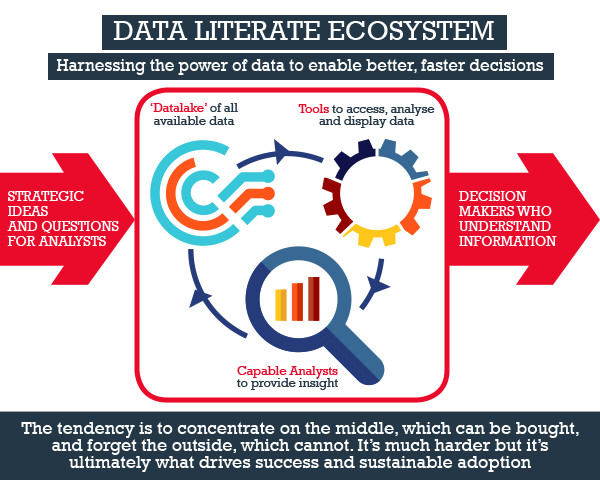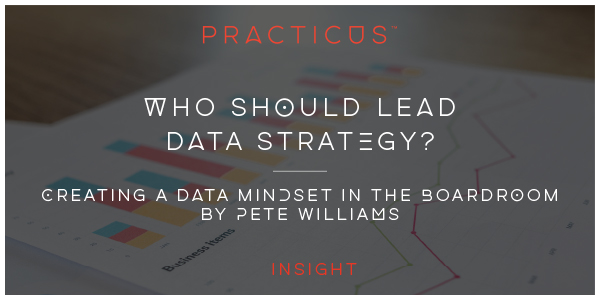Who Should Lead Data Strategy?
by Ben Culora.
As boardrooms across the world grapple with shaping a data-driven future for their business, there is real danger in believing the need for change lies outside of the room. Pete Williams, data evangelist and innovator, explores how companies need to adjust their thinking if they want to change their results.
There’s a common mistake made with anything new in business management: the belief that you can just buy it or hire it. This is particularly true when it comes to unlocking the power of data in a business. Buy a new system, hire some new faces – CVs suitably littered with appropriate buzz words – and Voila! Time to tell the shareholders.
This approach is reassuringly expensive but if your ambition is to transform your organisation and its competitiveness, it rarely produces more than comms-worthy quick wins. It’s all starter and no main course.
The good news is that the opportunity to transform the competitiveness of your organisation through data-based decision making is very real. Perhaps even better news is that it may not mean you need to blow the budget on flavour-of-the-month systems and painfully trendy job titles. However, you will have to invest in other ways, and one of the most demanding of these is on changing the way the Board thinks about data, and then flowing that throughout the organisation.
A data-literate mindset is key
To truly leverage your data assets, you must form a data literate ecosystem inside your organisation. Technology is important, data scientists are important and, of course, the data itself is important but the greatest importance by far goes to the strategic ideas and questions that are fed in and the ability of decision makers to understand the insight that feeds out. That’s why fostering data literacy amongst leaders in your organisation is the most important area for investment.

Chief among the myths of how data can transform a business is the belief that the secret of exponential business growth lies hidden amongst what you’re already doing. However, it’s fruitless to hunt for unicorns in the jungle of corporate systems, reporting tools and spreadsheet databases. Unicorns do not exist and the search area just keeps getting bigger while the timeframe you have to make quality, fact-based decisions is shrinking. You must do something different and to do that you need to think differently.
What will unlock growth is surfacing the right questions in ways that data sources can answer. It’s the curiosity-fuelled power of a data mentality that drives the better and timelier decision-making and it’s this that will improve an organisation’s fortunes.
Technology, of course, forms a component but again, it’s the mindset and the behaviours working with it that create value. For this reason, don’t fall for the trap that it’s the newest and shiniest tech that creates a source of competitive advantage. If you’re on a well-chosen modern platform that you feel is a little jaded or missing the latest visualisation styles, it probably won’t lag behind for long. Maintain pressure on your vendor while allowing your competitors to keep changing horses because each time they do, they will have to get back to where they were before they can attempt to get ahead.
Your data scientists are probably using open source languages anyway, your toolset is for democratising data to the wider business population. It is far more important to define the right processes around data and ensure they are slick, effective and embedded; that’s where value is created. Turning that thinking into a culture is how the advantage is sustained.
The purpose of a CDO
Many companies appoint a Chief Data Officer (CDO) because they understand that the organisation doesn’t have that data mindset. It’s important to contextualise the role of the CDO in exactly these terms. They are the data evangelists, there to educate the board, leadership team and the workforce at large on the potential of data. They are the voice of data in the room when opportunities or challenges are being discussed, ensuring appropriate data driven options are raised and considered.
It is crucial to recognise that data is not a subset of technology. The CDO is a partner to the CIO, a collaborator rather than a subordinate, whose role is in inspiring the organisation and driving commercial growth using the data collected and technology maintained by the CIO.
The CDO fronts up a capability that is first and foremost a decision-making discipline. It asks ‘What precisely do we need to know and how do we best draw relevant data to answer the question.’ And that’s why you also don’t need to be scared of data or feel it’s something alien that should sit outside of your boardroom. It’s about better defining the questions you and your colleagues are already asking and cultivating rapid processes to answer them, soundly.
So maybe the CDO is actually better titled the Chief ‘Decision’ Officer?
Where should a CDO sit?
Given they form an effective partnership, it’s a mistake to place a CDO below the CIO or make the CIO the new CDO. The skills, experiences and outlook are different. Making this move brackets data inside technology and moves the opportunities further from the commercial aspects of the organisation and therefore further from driving business growth.
Not many companies have created a space for a CDO at board level (though they should!) so a natural home close by and under an accountable senior sponsor needs to be found. Of the standard C-Suite roles, I most favour a home under the CFO. Finance understands the need for quality data and better decision making without competing on commercial strategy with other C-suite members. The CDO needs to be a horizontally-oriented role, executing across the pillars of what is usually a vertically oriented business, not pulled into one at the expense of others.
10 steps to a data mindset
Step 1 – Recruit a true specialist into your CDO role – a commercially oriented data evangelist who can constructively challenge you and your board around data in their decision-making and organise the resources to support it.
Step 2 – Map your data. Know where it comes from, how and when it’s transformed, where it’s stored, who uses it and how. Understand the quality.
Step 3 – Correlate your data and the business strategy. Understand where you may need more or other data to fulfil the strategy.
Step 4 – Meet the decision makers and understand their challenges. Focus on common (horizontal) challenges that drive the strategic initiatives and value across the business rather than departmental (vertical) solutions up and down
Step 5 – Educate the organisation on the decision opportunities data presents and how they ask the right questions to benefit.
Step 6 – Test and learn. Be scientific in your methods. Test hypotheses and measure the outcome, amend and try again. Don’t be afraid to stop if it’s not working.
Step 7 – Establish clear data governance, but from a starting position of open data. Remove restrictive, outdated constraints of who can see it and use it. Start with an open, easy access data policy then apply legal or commercial/personal sensitivity constraints when necessary. Seek ways to keep your data compliant but as open as possible.
Step 8 – The data mindset is rooted in curiosity. It’s a Question, not Statement based culture. Build reusable data based products that encourage a culture of self-service where people can seek the answers they need.
Step 9 – Don’t make data your organisational end goal. Be outcome focused. The data strategy supports and enables the business and customer strategy, not replaces or takes precedence over them.
Step 10 – Don’t let fears of data quality stop you making a start. You’re already running your business on this data, it can’t be much worse than now. So be aware of health warnings, but nothing speeds up quality improvements more than high frequency use in critical business decisions.
Pete Williams has been recognised as one of the most influential people in data-based decision making. He was named as one of the Power 10 by Data IQ in 2017 and featured in Information Age’s Data Top 50 in 2016 and the Data Titan 2016. If you’d like Pete’s support transforming data and decision making in your business, please contact Ben Culora at Practicus.
01491 577122




